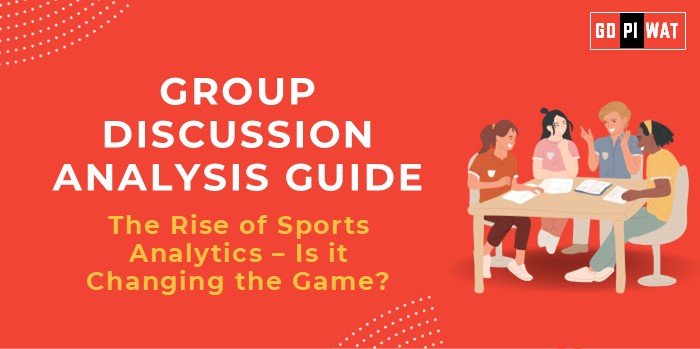📊 Group Discussion Analysis Guide: The Rise of Sports Analytics – Is it Changing the Game?
🌐 Introduction to The Rise of Sports Analytics
Sports analytics has revolutionized modern sports, transforming decision-making and team performance on and off the field. It has reshaped strategies, training methods, and fan engagement across sports globally.
Originating from early sabermetrics in baseball, sports analytics has evolved with advancements in big data, machine learning, and AI. Its adoption spans numerous sports, from baseball and basketball to soccer and cricket, with real-time data analysis becoming crucial for competitive advantage.
📊 Quick Facts and Key Statistics
- 📈 Sports Analytics Market Size: Expected to reach USD 5.11 billion by 2026, reflecting growing industry investment.
- 🏀 Adoption in Major Leagues: Over 70% of teams in the NBA and MLB use advanced analytics in player scouting and performance analysis.
- ⌚ Wearable Technology Usage: Increased by 45% among professional athletes in the past five years, enhancing injury prevention and performance tracking.
- 🎉 Fan Engagement Increase: 60% of fans report higher engagement when analytics are integrated into sports broadcasts.
🧑🤝🧑 Stakeholders and Their Roles
- ⚽ Sports Teams and Management: Use data for scouting, training, and game strategy, aiming to enhance performance and success rates.
- 💻 Analytics Firms and Tech Companies: Develop platforms and tools for data analysis, AI integration, and visualization.
- 🏋️ Athletes and Coaches: Leverage insights to refine techniques, improve health, and reduce injuries.
- 📺 Fans and Media Outlets: Engage with analytics-driven content, gaining deeper insights and interactive experiences.
🏆 Achievements and ⚠️ Challenges
🌟 Achievements
- 🚀 Enhanced Performance: Real-time data allows for optimized training, strategy formulation, and individualized player development.
- 🩺 Injury Prevention: Wearables and data analysis help monitor player health, predicting and preventing injuries.
- 📈 Informed Decision-Making: Data enables precise scouting and recruitment, identifying talent through objective metrics.
⚠️ Challenges
- 🔒 Privacy and Data Security: Athlete data requires careful handling to maintain privacy.
- 🚧 Resistance to Change: Traditional sports cultures may be skeptical of data-driven methods.
Global Comparisons: The NBA and English Premier League lead in data integration, while other leagues face infrastructure and financial barriers.
Case Studies:
- ⚾ Moneyball (MLB): Revolutionized player scouting and performance evaluation.
- ⚽ FC Barcelona (Soccer): Uses advanced analytics to maintain competitive advantage.
🗣️ Structured Arguments for Discussion
- 💬 Supporting Stance: “Sports analytics has transformed the competitive landscape, giving teams that adopt it a strategic edge.”
- 📏 Opposing Stance: “Over-reliance on data can undermine traditional sports values and the human aspect of gameplay.”
- ⚖️ Balanced Perspective: “While sports analytics enhances decision-making, it should complement rather than replace intuition and experience.”
📚 Effective Discussion Approaches
Opening Approaches:
- ⏳ Historical Reference: “Sports analytics traces back to baseball’s sabermetrics era, a pioneer that continues to influence modern sports.”
- 💡 Impact Statement: “Data-driven insights are changing the face of sports, allowing managers to make smarter, faster decisions.”
Counter-Argument Handling:
- 🔐 Privacy Concerns: “Data privacy is critical; measures like anonymization and ethical usage must be prioritized.”
- 📊 Over-reliance on Data: “While analytics are invaluable, they work best when balanced with experienced intuition.”
🔍 Strategic Analysis of Strengths and Weaknesses
Strengths:
- ✅ Performance Optimization
- ✅ Injury Prevention
- ✅ Fan Engagement
Weaknesses:
- ⚠️ Privacy Risks
- ⚠️ Data Misinterpretation
Opportunities:
- 🌍 Expansion to amateur and youth sports
- 🌐 Broader global adoption
Threats:
- ⚠️ Data misuse
- ⚠️ Resistance to change
🎓 Connecting with B-School Applications
Real-World Applications: Sports analytics knowledge can benefit project themes like strategic decision-making, big data applications, and risk management.
Sample Interview Questions:
- 📋 “How has sports analytics influenced player performance and injury prevention?”
- 📋 “Discuss the ethical concerns surrounding athlete data usage.”
Insights for B-School Students: Understanding sports analytics offers insights into data-driven decision-making, applicable in finance, operations, and management fields.


